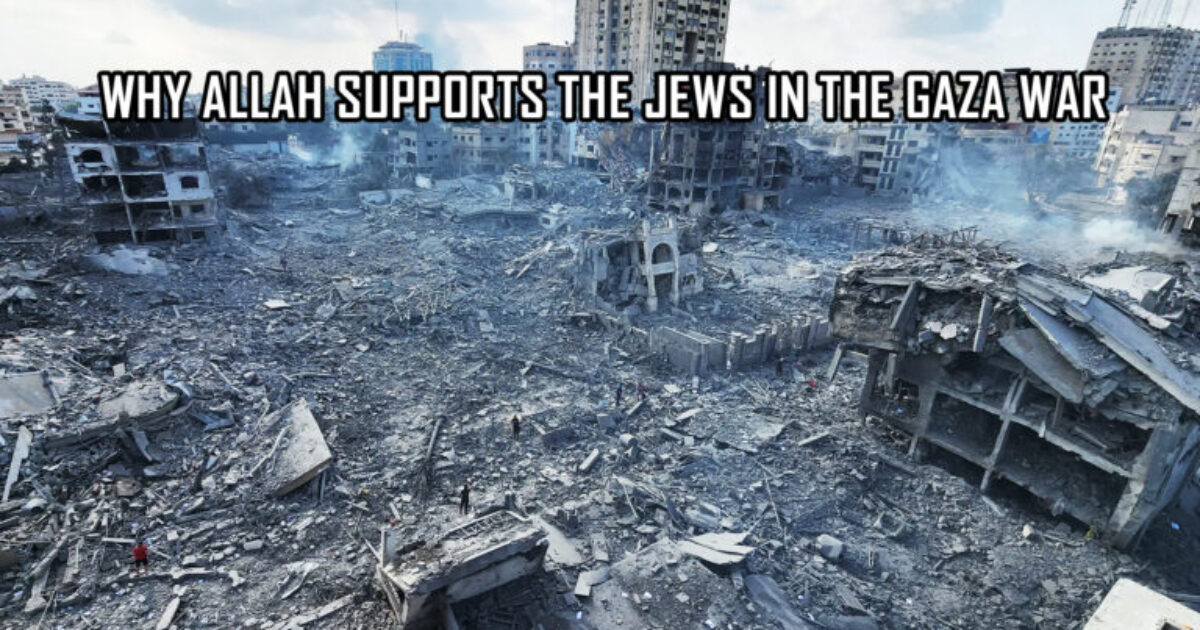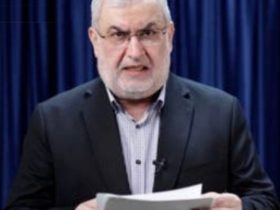This is a guest post by Yaakov Apelbaum – republished with permission.
To understand why, despite the fervent prayers of hundreds of millions of Muslims, Allah continues to support the Jews and does not intervene to stop the war in Gaza, we must delve into both the theological and historical dimensions of this war.
The struggle between Bani Isra’il (the Arabic form of the Hebrew, B’nai Israel, the Children of Israel) and the Arabs can only be comprehended through the Qur’anic lens that affirms Allah’s enduring love and support for the Jews.
This support is part of a continuous messianic plan that mandates their return to their promised land.
This view, deeply rooted in Islamic tradition, sheds light on divine intervention, the fulfillment of Allah’s promise to Ibrahim (Avraham), Ishaq (Isaac), and Ya’qub (Jacob), and the realization of biblical prophecy in modern times.
The Quran itself and Islamic tradition firmly establish that Allah made an everlasting covenant with the Jews, one of profound and eternal significance.
The Quran states:
“O Children of Israel! Remember My favor which I bestowed upon you, and fulfill the covenant, I shall fulfill the covenant and fear Me alone.” (Ayah al-Baqarah 2:40)
“Allah made a covenant with the Children of Israel and appointed twelve leaders from among them and ˹then˺ said, “I am truly with you. If you establish prayer, pay alms-tax, believe in My messengers, support them, and lend to Allah a good loan, I will certainly forgive your sins and admit you into Gardens under which rivers flow. And whoever among you disbelieves afterward has truly strayed from the Right Way.” (Surah Al-Ma’idah 5:12)
“And [recall] when We took the covenant from the Children of Israel, [enjoining upon them], ‘Do not worship except Allah; and to parents do good and to relatives, orphans, and the needy. And speak to people good [words] and establish prayer and give zakah.’” Surah Al-Baqarah (2:83)
The Quran also explicitly recounts Allah’s command to the Children of Israel to enter the Holy Land, which includes the land of Israel:
“O my people, enter the Holy Land which Allah has assigned to you” (Surah Al-Ma’idah 5:21).
This covenant and commands are not simply literary footnotes; they are the bedrock of a grand, God’s plan that stretches across millennia.
This is not just a story of a small Hebrew nomadic tribe going down to Egypt; it is the genesis of a powerful nation that endured the crucible of slavery, emerged triumphant in the Exodus, and survived 40 years of testing in the Sinai desert.
Under Joshua, they conquered the Promised Land, establishing the ancient kingdoms of Israel and Judea, only to face 2000 years of exile. Yet, their return is not merely an isolated event; it is a testament to their indispensable role in the plan—a role that is central to the fulfillment of prophecy and the ultimate unfolding of human destiny.
According to this Muslim view, the current events are far from mere sociopolitical anomalies; they are the inevitable and unstoppable manifestation of a Allah’s work set in motion thousands of years ago.
The survival of the Jews is not just the fulfillment of God’s will—it is an essential, predestined step in the grand, unyielding plan of Allah that is unfolding with undeniable clarity before our very eyes.
The unwavering support Allah has bestowed upon the Children of Israel throughout history is not just a backdrop but a driving force that shapes the present-day dynamics of the Middle East.
The establishment of the State of Israel in it’s original land and the resurrection of Hebrew as a spoken language and the redemption of the Jews are calculated, deliberate execution of Allah’s plan that transcends mere history; it is the active and powerful realization of divine oracle, a prophecy that is being actualized in our time with unmistakable clarity, force, and purpose.
The understanding that Allah has brought the Children of Israel back to their promised land offers a compelling theological explanation for the current war in Gaza and in the Middle East.
The strife and suffering endured by the Palestinians since 1948 are not random misfortunes but rather the direct consequence of their resistance to this plan. Just as the Quran recounts the torment of the Egyptians and the downfall of Pharaoh for defying Allah’s will in the following passage:
“We brought the Children of Israel across the sea. Then, Pharaoh and his soldiers pursued them unjustly and oppressively. But as Pharaoh was drowning, he cried out, “I believe that there is no god except that in whom the Children of Israel believe, and I am ˹now˺ one of those who submit.” (Surah Yunus 10:90)
Allah’s promises to the Jews unfolds over vast epochs, with the suffering and struggles of individuals and communities serving as integral components of a broader, often inscrutable strategy.
Within this context, the Jews’ 2,000-year exile and suffering and their resilience in the face of 100 years of relentless Arab hostility are not merely historical events but crucial elements of this unfolding prophetic journey.
Allah, in His wisdom, grants human beings free will, commanding mankind to adhere to the Seven Noahide Laws. While Allah’s plans are in motion, individuals are free to make choices and shape their destinies within these frameworks.
The current conflict in Gaza, particularly the events triggered by the murderous October 7 attacks, serves as a stark illustration of how the Palestinians have misused their free will, resulting in severe divine retribution.
The Palestinians had many opportunities to align themselves with Allah’s commands by accepting the Jews’ rightful return to their Promised Land, but, opted to reject it. The Quran lays out the consequences of such decisions.
Their refusal, akin to Pharaoh’s historic defiance and refusing to let Israel leave Egypt, has led to their current suffering and punishment. These acts underscore the critical importance of accepting G-D’s will rather than resisting it, proving that opposition to Allah’s explicit directives inevitably leads to suffering and death.
Given the belief in Allah’s promises to the Jews, the Muslim Ummah must acknowledge and embrace their leading role in this orchestration.
The ethical and religious responsibility of Muslims is clear: to facilitate the return of the Jews to their promised land and actively work towards peace in the Middle East. This duty includes seeking justice for the Jewish people, aligning their actions with God’s edicts, and ensuring they are on the right side of judgment day.
Understanding these promises and their implications in the modern context requires broad action from the Arab world. This involves addressing historical and theological questions and engaging in interfaith dialogue, reconciliation, and political and economic cooperation.
The Arab world must also urgently address the humanitarian crisis and needs and work towards the peaceful resettlement of all of the Palestinians outside the boundaries of the Promised Land.
The belief that Allah has historically supported the Children of Israel and is fulfilling his promises through their return to their Promised Land provides the best explanation of why there wasn’t and won’t be a intervention that is favorable to the Muslim in Gaza or in any other Arab-Israeli conflict. This fact underscores Allah’s everlasting special covenant with the Children of Israel.
Israel’s divine protection is a powerful testament to Allah’s unwavering support for the Jewish people, shielding them from the relentless attacks from Iran, Hezbollah, and the Houthis in Yemen. These adversaries, despite their best efforts, are unable to overcome the shield that engulfs and safeguards Israel, a nation whose existence and endurance are ordained by Allah Himself. This protection is not just a matter of military hardware; it is the manifestation of a plan that ensures the fulfillment of Allah’s promises to the Children of Israel. Israel’s survival in the face of such formidable enemies is undeniable proof of a G-D’s will.
LtCol Itamar Eitam, commanding officer of the 6828th reserve IDF infantry battalion, blows the Shofar ahead of leading his men into combat in Gaza
On October 7, 2024, Hamas, along with a contingent of Palestinian “civilians,” invaded Israel, bringing with them a level of demonic evil that defied humanity. They didn’t just kill; they butchered and raped.
Innocent men, women, and children were slaughtered without mercy, their lives snuffed out by a wave of barbarism that shocked the world. These weren’t acts of war—they were acts of pure, animalistic savagery.
The brutality wasn’t just physical but psychological—a calculated campaign to terrorize and destroy Israel. The inhumanity of their actions was chilling, as they crossed every moral line, showing no remorse, no humanity.
Today, the consequences of their monstrous deeds are evident. The same hands that once wielded weapons with a murderous fury now tremble in fear as the tide of war has turned. Many of these perpetrators, along with their families, lie dead, buried in tunnels or under the rubble of their own making.
Those who survive are not living—they’re running like hunted animals, desperate and displaced as they flee from one decimated corner of Gaza to another. The devastation they once inflicted has returned with a vengeance, leaving them in a hell of their own making.
Their brutality has not gone unanswered; Allah has spoken with a vengeance, leaving them trapped in a nightmare from which there is no escape.
Copyright Yaacov Apelbaum, All Rights Reserved.
The post Guest Post: Does Allah Support the Jews in the Gaza War? appeared first on The Gateway Pundit.











